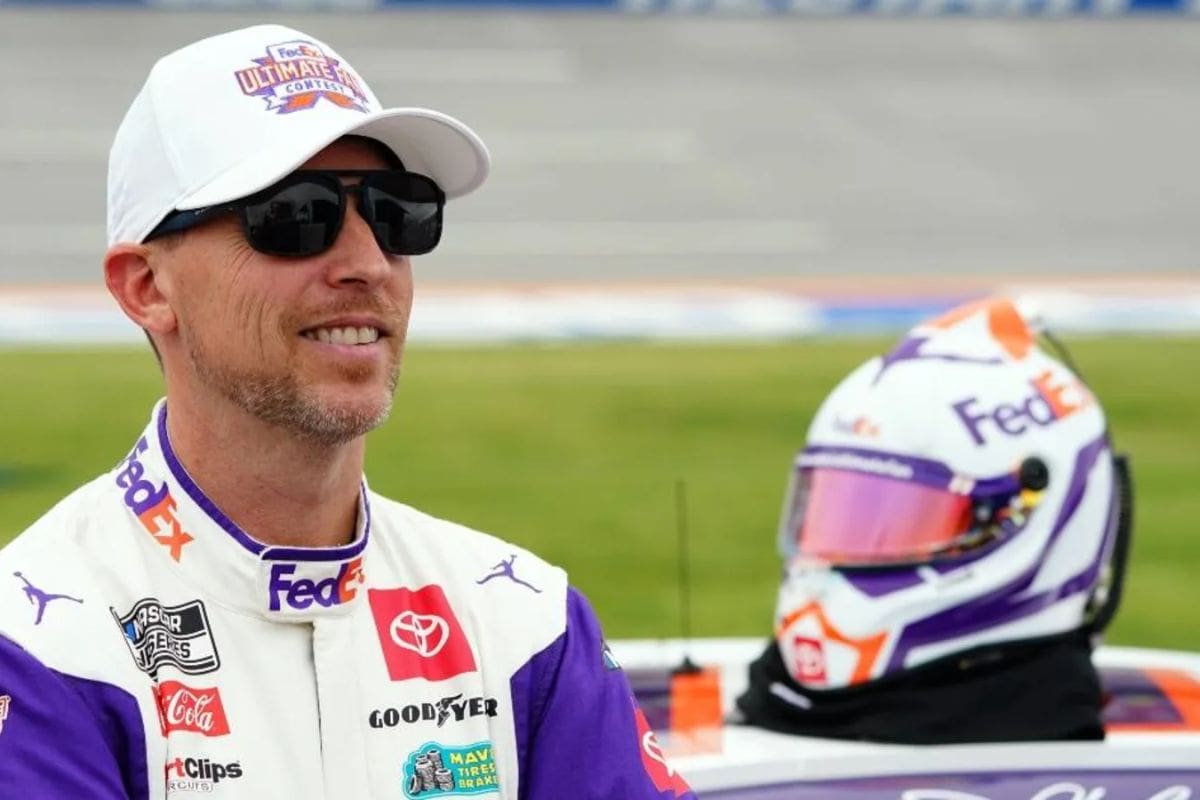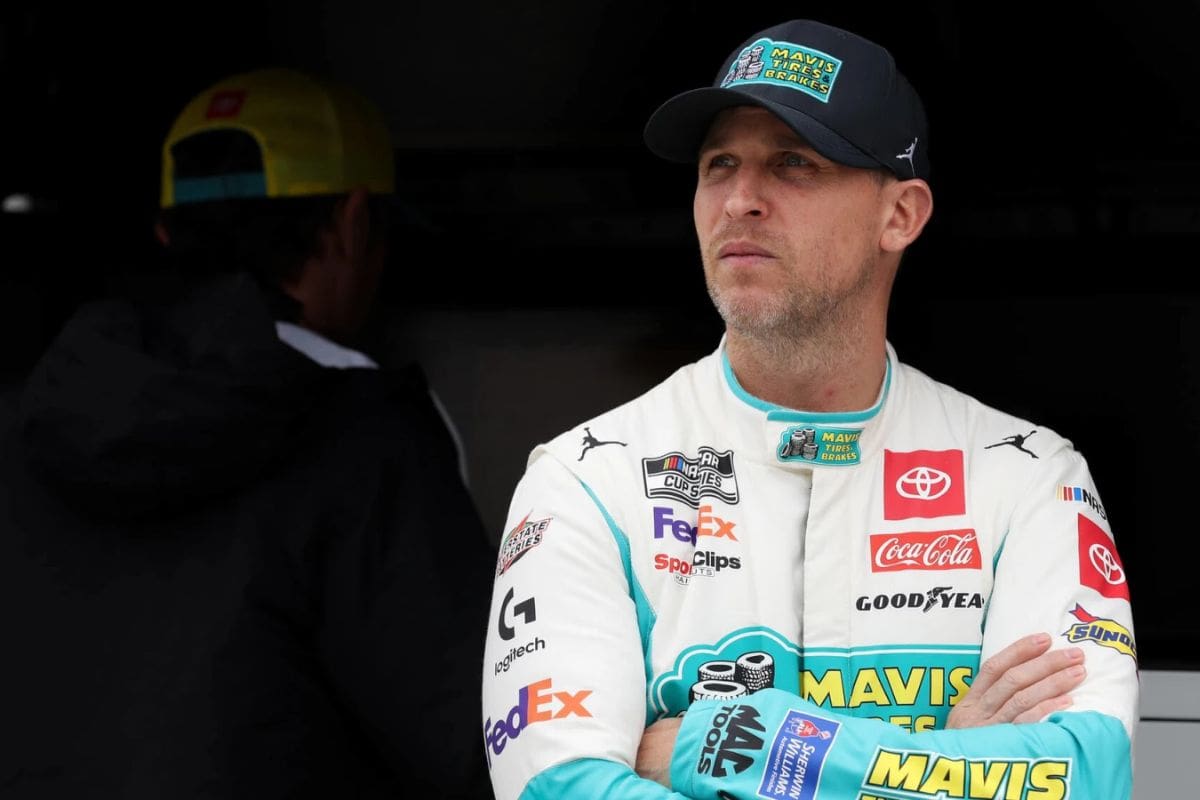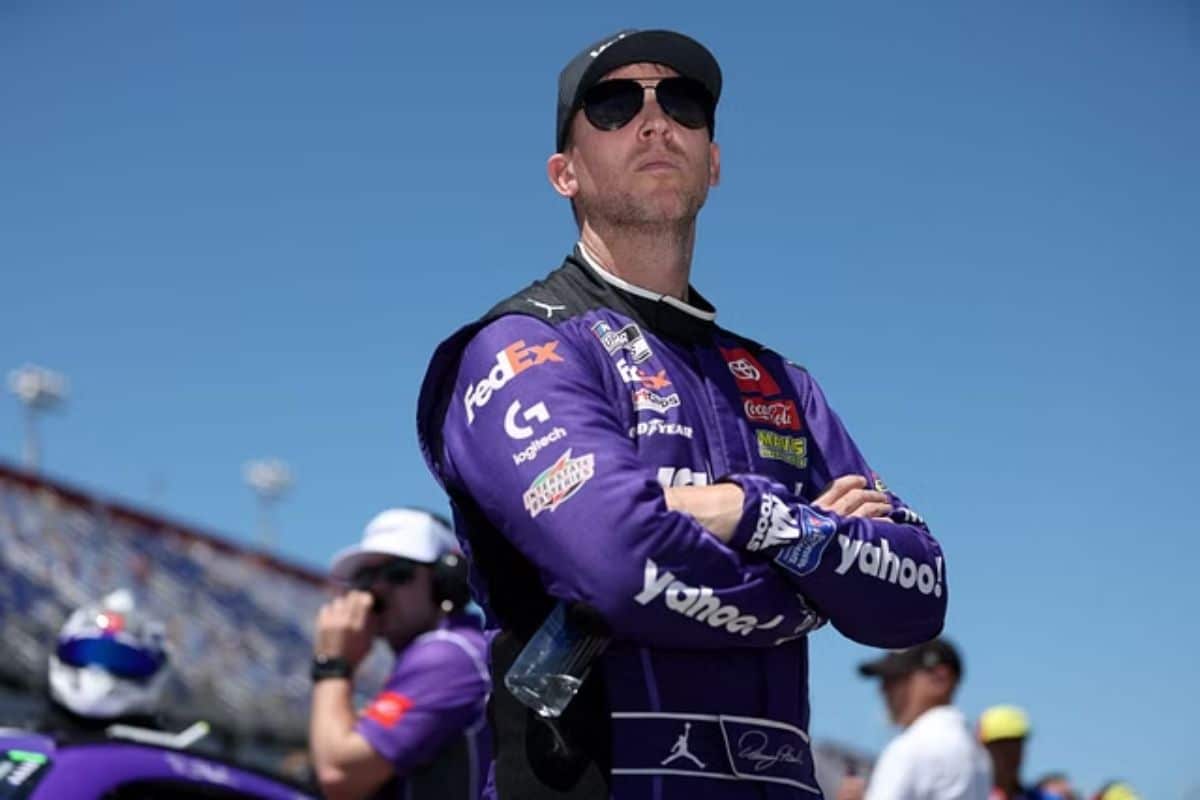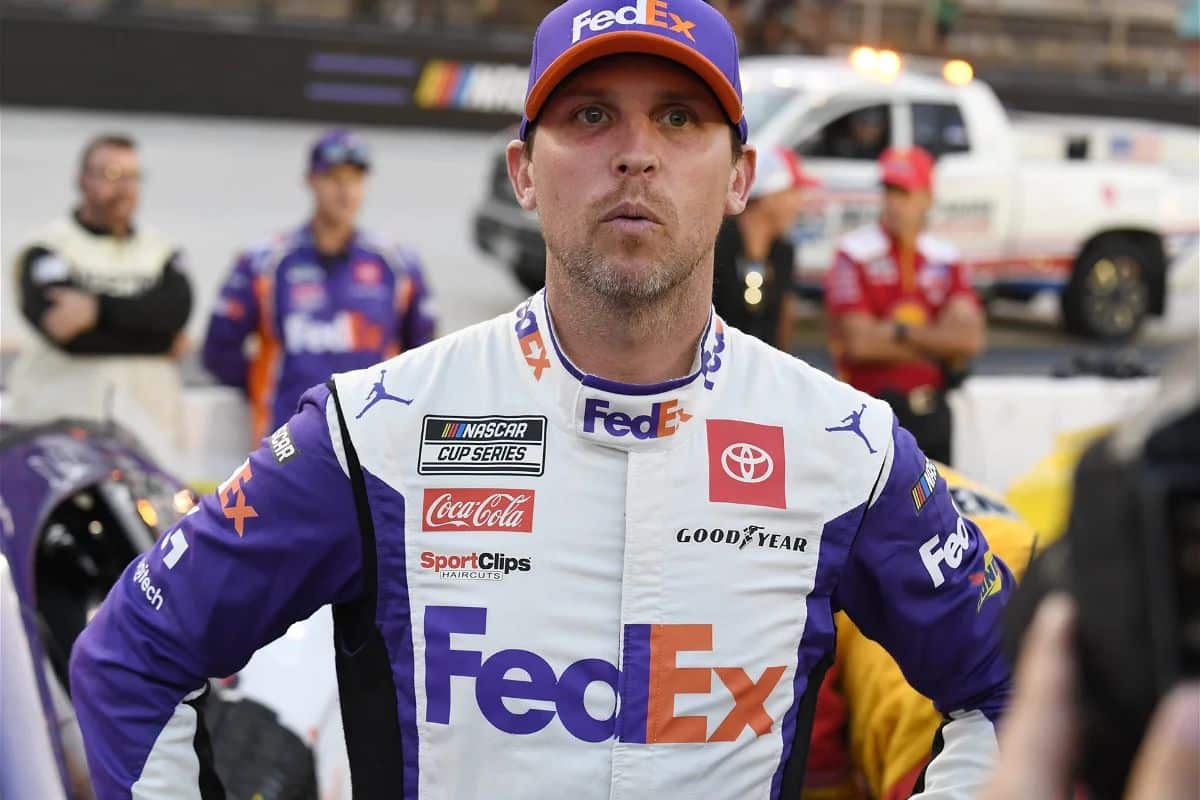Denny Hamlin Accuses NASCAR On Fines: In a recent episode of his podcast, NASCAR driver Denny Hamlin fearlessly tackled two of the most controversial issues gripping the sport: the imposition of fines and the ongoing charter discussions. With his characteristic candor, Hamlin navigated the intricate web of complexities and frustrations that drivers and teams encounter within the NASCAR framework. The conversation resonated with an unfiltered authenticity, shedding light on the multifaceted challenges inherent in the sport’s regulatory landscape. Hamlin’s willingness to address these controversial topics head-on showed his commitment to transparency and accountability within the NASCAR community.
As drivers and teams grapple with the consequences of fines and charter limitations, Hamlin’s podcast provided a platform for open dialogue and constructive discourse, offering insights into the variations of these controversial issues. By going into these debates, Hamlin sparked a conversation that transcended the confines of the racetrack, resonating with fans, industry insiders, and stakeholders.
NASCAR’s Outrageous Move
Hamlin kicked off the discussion by addressing the controversial topic of fines imposed for comments made on podcasts. He argued that opinions shared in such informal settings should not be grounds for punitive actions. “What are they moderating? What all the drivers are saying from here going out? Which I think they are. That’s part of the driver program,” Hamlin remarked. He questioned the fairness and consistency of NASCAR’s monitoring, noting that such actions could stifle honest dialogue among drivers. Hamlin emphasized that the informal nature of podcasts should allow for more freedom of expression without fear of retribution.
The debate was sparked by a recent incident where driver Kyle Busch was fined for comments made during a podcast. Hamlin defended Busch, emphasizing that such platforms are meant for open discussion and should not be subject to the same scrutiny as official statements made during races or press conferences. He argued that fining drivers for podcast remarks is an overreach by NASCAR, potentially curbing the drivers’ willingness to speak openly and candidly about the sport and their experiences. “You know, that shouldn’t be a factor,” Hamlin added, showing the need for a more lenient approach to regulating driver commentary in less formal settings.
Hamlin’s criticism extended to the broader implications of NASCAR’s monitoring practices. He suggested that constant oversight might lead to self-censorship among drivers, depriving fans of genuine insights and personal viewpoints that enrich their understanding of the sport. The fear of fines and penalties could deter drivers from engaging in honest discussions, ultimately harming the sport’s transparency and the connection between drivers and fans. This scrutiny, Hamlin warned, could create an environment where drivers are less likely to share their true thoughts, opting instead for safe, non-controversial comments that offer little substance.
The conversation also touched upon the role of the driver program in moderating these discussions. Hamlin indicated that NASCAR might be using the driver program as a tool to monitor and potentially censor what drivers say on various platforms. This level of control, he argued, is counterproductive to the spirit of open communication that podcasts and similar media promote. The intent behind these platforms is to offer a more relaxed and authentic glimpse into the lives and minds of the drivers, which could be compromised by excessive regulatory oversight.
Charter Limitations and Team Dynamics
Transitioning to the topic of charter limitations, Hamlin revealed insights into NASCAR’s plans to cap the number of charters a team can hold at three. This move, he speculated, is part of a broader strategy by NASCAR’s leadership, particularly Jim France, to balance competition and manage team sizes more effectively. By limiting the number of charters, NASCAR aims to prevent any single team from becoming too dominant and to encourage a more level playing field across the series. This cap is intended to foster greater competition and ensure that smaller teams have a better chance to succeed.
Hamlin noted that this cap could disproportionately affect larger teams like Stewart-Haas Racing (SHR), which currently operates four charters. “If you limit to three in the future, it will always be an advantage to then have four,” Hamlin stated, highlighting the potential imbalance this could create among the top-tier teams. He argued that teams with four cars, such as Hendrick Motorsports and Joe Gibbs Racing, already dominate the sport, and limiting other teams could aggravate this disparity. The concern is that these established powerhouses would retain a competitive edge, while teams forced to downsize would struggle to keep up, thereby entrenching the existing hierarchy.
“I don’t think the teams themselves actually requested. Doesn’t it also help by limiting the potential? Like let’s just theoretically say that Track House and 23XI are at 4 each, and JGR and HMS, and now suddenly you’ve got 12 cars in the playoffs. And it’s all from four teams or whatever you have, or call it even more. That’s what it’s going to be anyway. Come see me when it’s the final 8 or final 12. It ain’t going to be, but it’s just a couple teams in there, and that’s, you’re just not going to stop that. They’re trying everything they can, you know, parody, parody, parody.” – (hamlin)
The conversation also touched on the potential sale of SHR’s charters, with news expected to emerge imminently. Hamlin mentioned that teams are now looking at strategic alignments and data sharing to stay competitive. For instance, his own team, 23XI Racing, pays Joe Gibbs Racing for access to crucial data, which Hamlin believes is vital for maintaining a competitive edge. This arrangement allows 23XI Racing to benefit from the extensive resources and technical expertise of a top-tier team without needing to build such infrastructure from scratch. Hamlin emphasized that these alliances are crucial for smaller teams to remain competitive in an increasingly challenging environment.
“But it’s the same freaking three to four cars that are up front every single week. You’re not going to stop the best drivers, the best teams, the best crew chiefs, best pit crews from being the best. You’re not going to stop that. Um, so I don’t know, it’s, um, it’ll be interesting to see how it all comes together. But it, you know, we as, as, as I can speak for my group, just saying, you know, we’d like to get a deal done soon, sooner than later because certainly it’s hard to plan for the future when we don’t have a charter agreement. And right now we don’t. Yeah, one before we move on from this particular point.” – (Hamlin)
Hamlin expressed concern that capping charters could hinder the overall growth and dynamism of the sport. He argued that larger teams benefit from more data points and resources, which are crucial for success in NASCAR. For example, having more cars allows teams to collect more data on different setups and strategies, giving them a comprehensive understanding of performance variables. This knowledge can be shared among all drivers within the team, enhancing their collective performance. Restricting the number of charters could limit this data flow, potentially reducing the competitiveness of affected teams.
Impact on Smaller Teams
Hamlin’s concern about the potential impact of charter limitations on smaller teams shows the intricate dynamics within NASCAR’s competitive landscape. He argued that larger teams inherently possess significant advantages due to their access to more data points and resources, essential elements for success in the sport. The alliance between 23XI Racing and Joe Gibbs Racing serves as a prime example of this phenomenon, showing how smaller teams can leverage partnerships with established powerhouses to strengthen their competitiveness.
“What’s going to happen then is if you cap it at three and say that’s all you can do, 2311, you can only be three for the rest of your lives. I’m going to say, ‘Well, okay, how am I going to beat Gibbs and Hendrick then?’ I mean, it’ll be tough, and especially if they’re trying to put some sort of salary cap or something into this thing, like it’s always going to… you’re going to have more resources; the numbers are going to just keep going the more you have.” – (hamlin)
In the case of 23XI Racing, the strategic alliance with Joe Gibbs Racing provides invaluable access to JGR’s extensive infrastructure and expertise. This collaboration enables 23XI Racing to tap into a wealth of technical resources, including advanced data analysis tools, state-of-the-art facilities, and experienced personnel. By leveraging JGR’s resources, 23XI Racing can enhance its performance on the track and remain competitive amidst the challenges posed by larger teams.
“So it’s, um, I don’t know that I necessarily agree with that, for sure, for sure. But what about, correct me if I’m wrong, but your 2311 drivers are in competition meetings with JGR, right? Y’all are sharing data; you have the data necessary to compete against them. Is, we need, we need to have more data points, so we pay a fee to Joe Racing every year to have access to sit in those meetings and look at their data. So if we pay a big fee for it, so, okay, well, if I mean, I think if you are going to tell every team that they’re only allowed, I don’t know, three charters, whatever it may be, then you just have to also limit that teams are not to be sharing data amongst each other.” – (Hamlin)
One of the primary advantages of such alliances is the ability to share crucial data and insights between teams. With access to JGR’s extensive data collection and analysis capabilities, 23XI Racing can benefit from a broader range of performance metrics and insights. This data sharing allows 23XI Racing to fine-tune its race strategies, optimize car setups, and identify areas for improvement, ultimately enhancing its competitiveness on race day.
Hamlin’s remarks show the critical role of strategic alliances in leveling the playing field for smaller teams in NASCAR. By forging partnerships with established organizations like Joe Gibbs Racing, smaller teams like 23XI Racing can access the resources, expertise, and technical support needed to compete at the highest level. As NASCAR continues to evolve, fostering collaboration and cooperation between teams of all sizes will be essential in ensuring the sport’s long-term growth and competitiveness.
NASCAR’s Vision For The Future
Despite the concerns raised, Hamlin acknowledged NASCAR’s overarching vision to attract new ownership groups by spreading out charters. This strategic move aims to diversify team ownership and bring fresh perspectives into the sport. By expanding the pool of owners, NASCAR hopes to foster innovation, increase competitiveness, and ensure the long-term sustainability of the sport. However, Hamlin questioned whether the current business model within NASCAR is sufficiently appealing to entice new investors.
Hamlin’s skepticism stems from the challenges inherent in the sport’s structure and operational framework. The high costs associated with team ownership, including equipment, personnel, and logistical expenses, present significant barriers to entry for prospective owners. Additionally, the complexities of navigating NASCAR’s regulatory landscape, including the approval processes for new owners, add complexity to the issue. Hamlin emphasized the need for transparency and clarity in these approval processes to facilitate smoother transitions for new entrants.
Hamlin highlighted the importance of ensuring that new ownership groups align with NASCAR’s values and objectives. While attracting new investors is crucial for the sport’s growth, it is equally important to maintain the integrity and competitiveness of NASCAR racing. Hamlin emphasized the need for strict vetting processes to ensure that new owners are committed to upholding the sport’s traditions and contributing positively to its future development.
Hamlin’s remarks shed light on the challenges and opportunities associated with NASCAR’s vision for the future. While the goal of attracting new ownership groups is commendable, it requires careful consideration of the sport’s business model, regulatory framework, and core values. By addressing these challenges head-on and fostering a supportive environment for new investors, NASCAR can pave the way for a more vibrant, competitive, and sustainable future for the sport.
News in Brief: Denny Hamlin Accuses NASCAR On Fines
Denny Hamlin’s courageous exploration of the pressing issues facing NASCAR reflects the spirit of open dialogue and transparency that is essential for the sport’s continued growth and evolution. By fearlessly addressing topics such as fines and charter limitations on his podcast, Hamlin has provided a valuable platform for drivers, teams, and fans to engage in meaningful discussions and advocate for positive change within the NASCAR community. As the sport navigates the complexities of its regulatory landscape, it is imperative that stakeholders remain committed to fostering an environment of accountability, fairness, and inclusivity.
Our Reader’s Queries
Q. What did Denny Hamlin do in NASCAR?
A. Denny Hamlin, piloting the No. 11 Toyota for Joe Gibbs Racing, also co-owns 23XI Racing alongside NBA legend Michael Jordan in the NASCAR Cup Series. Hamlin has accumulated 54 wins, with notable victories in the Coca-Cola 600 (2022), Daytona 500 (2016, 2019, 2020), and Southern 500 (2010, 2017, 2021).
Q. Has Denny Hamlin ever won a NASCAR championship?
A. After surpassing Mark Martin’s 40 wins, Denny Hamlin has become the winningest driver to never capture a NASCAR Cup Series championship. Much like the 1990s and 2000s legend, Hamlin has had numerous opportunities to clinch the title.
Q. How many races has Denny Hamlin won in 2024?
A. Just a week ago, Denny Hamlin claimed his third victory of 2024 at Dover Motor Speedway, winning only days after predicting his success on his podcast, “Actions Detrimental.





